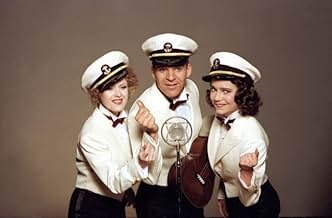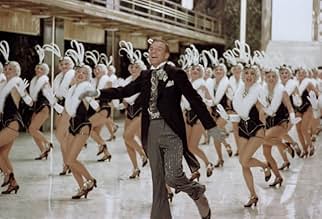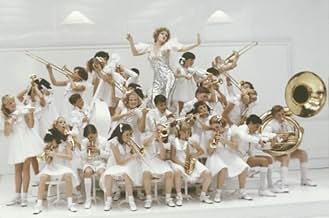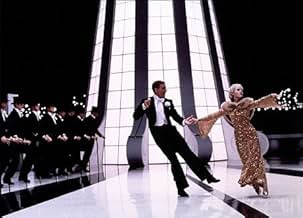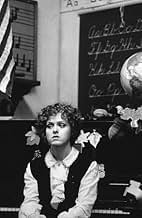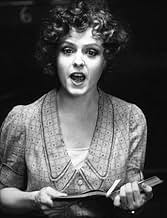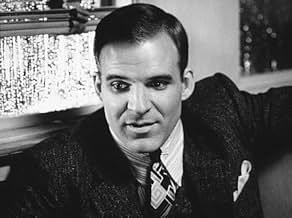IMDb-BEWERTUNG
6,5/10
6543
IHRE BEWERTUNG
Füge eine Handlung in deiner Sprache hinzuDuring the Great Depression, a sheet-music salesman seeks to escape his dreary life through popular music and a love affair with an innocent schoolteacher.During the Great Depression, a sheet-music salesman seeks to escape his dreary life through popular music and a love affair with an innocent schoolteacher.During the Great Depression, a sheet-music salesman seeks to escape his dreary life through popular music and a love affair with an innocent schoolteacher.
- Für 3 Oscars nominiert
- 3 Gewinne & 9 Nominierungen insgesamt
Francis X. McCarthy
- The Bartender
- (as Frank McCarthy)
Shirley Kirkes Mar
- Tart
- (as Shirley Kirkes)
Empfohlene Bewertungen
This film has so many good things in it and so much talent worked so very hard on it that it's just baffling to me that so much of it doesn't work. I love '30s and '40s musicals, and I saw this film in 1981, and I've seen it about 10 times more on DVD. I like a lot of it, but somehow it's just not a very good movie, and I still can't figure out why.
The music is good. The musical numbers are creatively shot and well-executed; the Walken number alone took weeks to film. The sets, costumes, photography, and color are beautiful and give the film a real Depression feel. Clearly, no expense was spared. The actors give it their all. The re-creations of photos and paintings (including "Nighthawks" which is actually from WW2) are breathtaking. They must have been very hard to set up, light, and shoot. But, in keeping with the film's low-key style, they're not lingered on at all, and if you look away you can miss them.
Is the problem Steve Martin? This choice caused some controversy in 1981. He lacked film experience and he might not have been the ideal choice, although it's hard to guess what other leading man could have done that vaudeville stuff in 1981. Martin, at least, doesn't obviously fall down on the job; the verdict is still out. But Peters, who even apart from this film seems to belong to the '30s, holds up her end of things.
Maybe it's the script and the way the film is conceived. If the idea is to realize what these '30s drudges fantasize about-- and to do it in a '30s-musical style, as if they imagine themselves the heroes of musicals-- then there has to be something to the drudges that makes us care what they fantasize about. But there isn't enough to these people. They're drawn as thin types; yet the material is played very slowly, as if they were supposed to turn into real people at some point. They never do, and so by the end it all peters out (no pun intended). I also thought the subplot with the young girl was a maudlin absurdity, right out of a Mary Pickford tear-jerker.
Perhaps the real problem can be traced back to the origins of the project. It plays almost like an English musical made in an American style, and it doesn't work very well. The humor in the book is too tedious, too black, and too obsessed with tit jokes to be American. And the musical numbers are too slick, loud, and overproduced to be English. The filmmakers couldn't find a way to make these two parts fit together. And so they are just jammed together over and over again. One is constantly aware of the bad fit. It just doesn't come together, but in the various parts there are still more than enough reasons to see it.
The music is good. The musical numbers are creatively shot and well-executed; the Walken number alone took weeks to film. The sets, costumes, photography, and color are beautiful and give the film a real Depression feel. Clearly, no expense was spared. The actors give it their all. The re-creations of photos and paintings (including "Nighthawks" which is actually from WW2) are breathtaking. They must have been very hard to set up, light, and shoot. But, in keeping with the film's low-key style, they're not lingered on at all, and if you look away you can miss them.
Is the problem Steve Martin? This choice caused some controversy in 1981. He lacked film experience and he might not have been the ideal choice, although it's hard to guess what other leading man could have done that vaudeville stuff in 1981. Martin, at least, doesn't obviously fall down on the job; the verdict is still out. But Peters, who even apart from this film seems to belong to the '30s, holds up her end of things.
Maybe it's the script and the way the film is conceived. If the idea is to realize what these '30s drudges fantasize about-- and to do it in a '30s-musical style, as if they imagine themselves the heroes of musicals-- then there has to be something to the drudges that makes us care what they fantasize about. But there isn't enough to these people. They're drawn as thin types; yet the material is played very slowly, as if they were supposed to turn into real people at some point. They never do, and so by the end it all peters out (no pun intended). I also thought the subplot with the young girl was a maudlin absurdity, right out of a Mary Pickford tear-jerker.
Perhaps the real problem can be traced back to the origins of the project. It plays almost like an English musical made in an American style, and it doesn't work very well. The humor in the book is too tedious, too black, and too obsessed with tit jokes to be American. And the musical numbers are too slick, loud, and overproduced to be English. The filmmakers couldn't find a way to make these two parts fit together. And so they are just jammed together over and over again. One is constantly aware of the bad fit. It just doesn't come together, but in the various parts there are still more than enough reasons to see it.
I saw "Pennies from Heaven" in the theater and I've seen it several times since. It has always been an unsatisfying watch. It's just too downbeat. Director Herbert Ross and company deserve an E for effort but the movie doesn't work as well as it should. Steve Martin's character is just too unlikable. The misery he spreads is just too much. The movie does look great. The set design and costumes are terrific. The musical numbers are very good. "Pennies from Heaven" jerks the audience from one extreme to another. It's often an uncomfortable movie to watch.
When Herb Ross opened "Pennies From Heaven" during Christmas of 1981 it met with harsh press and public indifference. Many concluded the musical was dead.
But "Pennies," like Bob Fosse's "All That Jazz" released two years before, is a key transitional work that juxtaposed the cynicism of the '70s to the exhilaration and escapist fantasy of its buoyant Depression era score.
Steve Martin ran the risk of alienating his fan base by trading in the "Wild and Crazy" guy for the brooding, unfaithful Arthur Parker. But he's a revelation. And what a dancer!
It was no surprise when audiences stayed away.
By all means watch it today, particularly on the new widescreen DVD release. You'll walk away with a greater appreciation of Christopher Walken, Bernadette Peters and especially Steve Martin.
It makes it so much harder to watch this major talent wasting himself in such tripe as "Cheaper by the Dozen" and "Bringing Down the House."
But "Pennies," like Bob Fosse's "All That Jazz" released two years before, is a key transitional work that juxtaposed the cynicism of the '70s to the exhilaration and escapist fantasy of its buoyant Depression era score.
Steve Martin ran the risk of alienating his fan base by trading in the "Wild and Crazy" guy for the brooding, unfaithful Arthur Parker. But he's a revelation. And what a dancer!
It was no surprise when audiences stayed away.
By all means watch it today, particularly on the new widescreen DVD release. You'll walk away with a greater appreciation of Christopher Walken, Bernadette Peters and especially Steve Martin.
It makes it so much harder to watch this major talent wasting himself in such tripe as "Cheaper by the Dozen" and "Bringing Down the House."
It's 1934 Chicago. Sheet music salesman Arthur Parker (Steve Martin) can't get any love from his wife Joan (Jessica Harper) both in the bedroom and in the bank book. She wants to keep her inheritance for a rainy day but he wants to use it for his business. He befriends penniless hitchhiking Accordion Man. He falls for school teacher Eileen (Bernadette Peters) and they have a short affair as he lies to her about being a widow telling her to "take the pain away". His wife Joan entices him back with sex and money. Eileen is fired for being pregnant out of wedlock. Arthur meets a blind girl calling her beautiful. Later the Accordion Man rapes her and kills her. A desperate Eileen falls into the arms of Tom the pimp (Christopher Walken).
This is a sad depressing movie juxtaposed by the bright shiny surreal song and dance show. The story is such a downer. Arthur is a horrible person. Eileen is an innocent that is destroyed. There is a horrible crime. Yet this is a fantasy with dance reminiscent of the 30s except darker. It's a very odd mix and is almost experimental in its nature. It's definitely not a comedy.
This is a sad depressing movie juxtaposed by the bright shiny surreal song and dance show. The story is such a downer. Arthur is a horrible person. Eileen is an innocent that is destroyed. There is a horrible crime. Yet this is a fantasy with dance reminiscent of the 30s except darker. It's a very odd mix and is almost experimental in its nature. It's definitely not a comedy.
10robb_772
An Americanized adaptation of the six-part 1978 British miniseries, underrated director Herbert Ross' brilliant PENNIES FROM HEAVEN was a huge commercial flop in US when originally released. Audiences of 1981 did not seem to understand the concept of a depression-era musical, where the actors lip-synch to original recording from the in 1930s in elaborate fantasies that are far removed from the actual world in which they inhabit. Though extremely unconventional, this device is absolutely heart-wrenching as the dreariness of the real world breaks away to the brightly-colored, perpetually optimistic fantasy land that only lives in the lyrics of popular songs. It is the eternal agony of the dreamer that is expressed; the cold reality that leaves us destined to reach for the sky, but doomed to walk the earth.
This leaves the film's cast with a difficult task, as they must not only contend with their dramatic art, but also be well versed in a variety of demanding dances and highly disciplined choreography. Comedian Steve Martin is far from the first choice to portray the downtrodden protagonist in any film, but the actor acquits himself expertly in both the film's demanding dance and drama. Mousy Jessica Harper delves into her eternally repressed character so deeply that one is never certain where one stops and the other begins; a triumph of form for any thespian. Renowned dancer Vernel Bagneris is mesmerizing as the film's most ambiguous character, and his density-defying dance to Arthur Tracy's heartbreaking rendition of the title song is one of my favorite moments in any film.
Even more impressive is tough guy actor Christopher Walken's then-unexpected prowess on the dance floor, as he delivers a riotously funny and surprisingly sexy striptease to Irving Aaronson's "Let's Misbehave." In this sequence, Walken pulls off the difficult hat trick of satisfying both seasoned viewers and film neophytes, while still managing to leave both groups wanting more. Best of all, however, is the lovely Bernadette Peters in a superb, Golden Globe award-winning performance. Never before has Peters' slightly tarnished Kewpie-doll personae been better utilized, and the actress' transformation from repressed schoolmarm to hardened prostitute feels both stunningly and horrifyingly real.
Herbert Ross and his creative team manage to bind all of the pieces together into one seamless collage of lost hope, forced optimism, and never-ending desperation. Gordon Willis' cinematography is never less than completely awe-inspiring, and the combined efforts of top-drawer art and set direction and Bob Mackie's seemingly authentic period costumes helps cement the look and feel of desolate decade that the film represents. Over all films in every genre, PENNIES FROM HEAVEN would be a likely contender to receive my vote for the single most underrated film masterpiece of the last twenty years. It exudes all of the contradictory joy and heartbreak that the movies offer, and serves it all up in one stunning presentation.
This leaves the film's cast with a difficult task, as they must not only contend with their dramatic art, but also be well versed in a variety of demanding dances and highly disciplined choreography. Comedian Steve Martin is far from the first choice to portray the downtrodden protagonist in any film, but the actor acquits himself expertly in both the film's demanding dance and drama. Mousy Jessica Harper delves into her eternally repressed character so deeply that one is never certain where one stops and the other begins; a triumph of form for any thespian. Renowned dancer Vernel Bagneris is mesmerizing as the film's most ambiguous character, and his density-defying dance to Arthur Tracy's heartbreaking rendition of the title song is one of my favorite moments in any film.
Even more impressive is tough guy actor Christopher Walken's then-unexpected prowess on the dance floor, as he delivers a riotously funny and surprisingly sexy striptease to Irving Aaronson's "Let's Misbehave." In this sequence, Walken pulls off the difficult hat trick of satisfying both seasoned viewers and film neophytes, while still managing to leave both groups wanting more. Best of all, however, is the lovely Bernadette Peters in a superb, Golden Globe award-winning performance. Never before has Peters' slightly tarnished Kewpie-doll personae been better utilized, and the actress' transformation from repressed schoolmarm to hardened prostitute feels both stunningly and horrifyingly real.
Herbert Ross and his creative team manage to bind all of the pieces together into one seamless collage of lost hope, forced optimism, and never-ending desperation. Gordon Willis' cinematography is never less than completely awe-inspiring, and the combined efforts of top-drawer art and set direction and Bob Mackie's seemingly authentic period costumes helps cement the look and feel of desolate decade that the film represents. Over all films in every genre, PENNIES FROM HEAVEN would be a likely contender to receive my vote for the single most underrated film masterpiece of the last twenty years. It exudes all of the contradictory joy and heartbreak that the movies offer, and serves it all up in one stunning presentation.
Wusstest du schon
- WissenswertesChristopher Walken's bar-top dance scene took two months of rehearsal and two days of shooting. He claims he got compliments later from fans Fred Astaire and Gene Kelly.
- PatzerIn the classroom, a modern Canadian flag can be seen. It wasn't designed until 1964.
- Zitate
Joan Parker: [referring to Arthur's male organ, after discovering he's having an affair] Cut his thing off.
[the detective shows a look of shock and disgust]
Joan Parker: I want them to cut his thing off and bury it!
- SoundtracksPennies from Heaven
(1936)
Written by Johnny Burke and Arthur Johnston
Published by Intersong Music
Performed by Arthur Tracy
Courtesy of Decca Co. Ltd
Later sung by Steve Martin (uncredited)
Top-Auswahl
Melde dich zum Bewerten an und greife auf die Watchlist für personalisierte Empfehlungen zu.
- How long is Pennies from Heaven?Powered by Alexa
Details
- Erscheinungsdatum
- Herkunftsland
- Sprache
- Auch bekannt als
- Pennies from Heaven
- Drehorte
- 4th Street Bridge, Los Angeles, Kalifornien, USA(murder scene, S Santa Fe Ave. Overpass)
- Produktionsfirmen
- Weitere beteiligte Unternehmen bei IMDbPro anzeigen
Box Office
- Budget
- 22.000.000 $ (geschätzt)
- Bruttoertrag in den USA und Kanada
- 9.171.289 $
- Weltweiter Bruttoertrag
- 9.171.289 $
- Laufzeit1 Stunde 48 Minuten
- Sound-Mix
- Seitenverhältnis
- 1.85 : 1
Zu dieser Seite beitragen
Bearbeitung vorschlagen oder fehlenden Inhalt hinzufügen

Oberste Lücke
By what name was Tanz in den Wolken (1981) officially released in India in English?
Antwort


